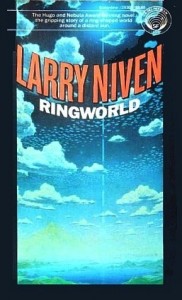1) “This book is sexist,” some will say. Um, okay… I don’t agree. The book certainly follows mostly male characters having only a couple of female characters. Having read most of Niven’s stuff, he obviously writes better male characters than female. You can certainly say it does NOT portray strong female characters. But sexist? I think not.
The ONLY female character per say in this novel is Teela Brown. One of the major themes of the novel has to do with artificial selection of some of the galaxy’s species (Humans and Kzinn) who have been manipulated by the Puppeteers. The Puppeteers have manipulated the Earth’s “Fertility Laws”, creating a Fertility Lottery, the winners of which earn the right to bear children in addition to those allowed by law. The aliens’ goal was to breed humans for LUCK. Teela, you eventually discover, is a result of this evolutionary process and it could be argued is NOT exactly a human female.
Teela’s character portrays shallowness, an apparent need to pretend to rely on a strong male character, an inability to understand real pain (physical or emotional), and a habit of not thinking things through completely. The main male character Louis Wu notices this through out the novel. This is NOT some comment or judgement on NORMAL female behavior but the OPPOSITE. It are these “symptoms” that begins to show that Teela is NOT normal, that she has not really grown up, as her luck has sheltered her and caused her not to experience the negative parts of life that mold a complete adult human (be they male or female).
The story goes on to say that in a way it is her luck which drives the entire story (even the visit to the Ringworld) making her character MORE important in some ways than all the other male characters combined. Some of this info is revealed more fully in the sequel Ringworld Engineers, which I’m sure others will slam (possibly more accurately if for completely different reasons) as also being sexist.
The only other female character in the story is also basically an alien. Another “species” of human, that has grown up in a completely different culture and society than Earth’s, lived hundreds of years as a professional prostitute on a space ship traveling at relativistic speeds, lived alone (a somewhat educated woman among savages) for hundreds of years more, and is now being manipulated by another alien (a puppeteer again) to get her to assist the main characters. People again cite this character as an example of Niven being sexist. REALLY?! This female is about as far as you can get from a normal human female and that was the POINT. To create a difference, to explore alien possibility not to imply that THIS is what females are or should be.
Another sexist point some will try to make about this novel is it’s exploration of bizarre possibilities in fictional alien biology, which certainly is not a comment on human genders, and shouldn’t be taken as such. In Niven’s “universe” one of the alien races (the cat-like Kzinn,) only the male of the species is sentient. The females are basically pets kept to breed and care for the very young. Another VERY alien race (the Pupeteers) say they have two male genders and refer to the third not-sentient host animal as the “female”. However this is the cultural bias of the ALIENS, and does not reflect their actual biology, one is clearly female as it deposits eggs into the host that the male then fertilizes in the host. These alien’s are more like digger wasps here on earth.
In summary, it’s about creating an exciting, fictional adventure story that has some interesting exploration of scientific ideas (both hard science and sociological). It is NOT an attempt to make some comment on the female gender of today, and trying to drag sexism, racism or any other “isms” into a discussion of this novel is ludicrous.
2) Other negative reviews seem to say, “This novel is juvenile.” There is part of me that wants to say, “Hell, yeah. That’s why I like it.” But really I think the book is MUCH deeper than its sci-fi adventure story roots.
Yes, it is almost a fantasy exploration of a BDO (big dumb object). Yes, you could compare it to the Wizard of Oz if you want with the characters strangely mixed up. Nessus the Puppeteer would be the cowardly lion in need of courage he already has but won’t admit to. The lion-looking Speaker to Animals is the Tin Man looking to find his heart (earn his name and a chance to breed). Teela thinks she’s just along for the ride, but she’s really Dorthy — her luck is looking to bring her to the “home” she needs which it turns out is the Oz of the Ringworld. And the protagonist Louis Wu is, in many respects, simply Toto, acting as our eyes into this adventure. He gets the characters home through his keen observation and reasoning in the end, but really he is the pet along for the ride.
So yes, it is all those things which some might call juvenile. But it also has a TON of adult, “hard science”. There is the very idea of the Ringworld itself; explorations of evolution & artificial selection; sociological exploration of societies dealing with isolation due to travel at relativistic speeds, and vast distances (in space and on the Ringworld); imagining implications of possible future technologies like teleportation and space travel; imagining realistic possibilities in alien biology & cultures; musings on the ways we might deal with overpopulation and its effects.
 Ringworld by Larry Niven
Ringworld by Larry Niven![]() 5 out of 5 stars
5 out of 5 stars
One thought on “Review: Ringworld”